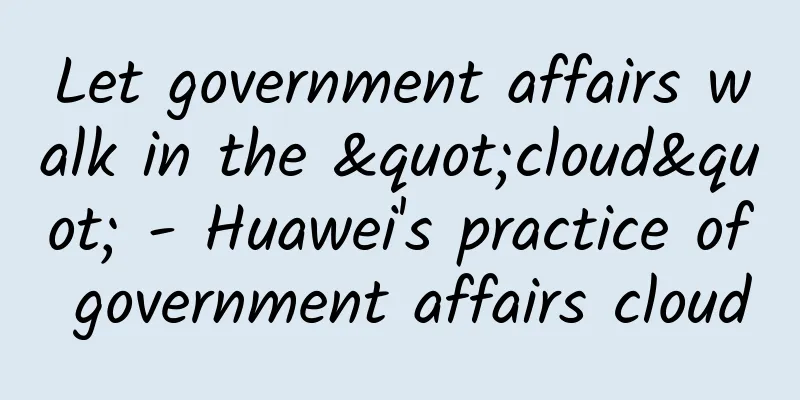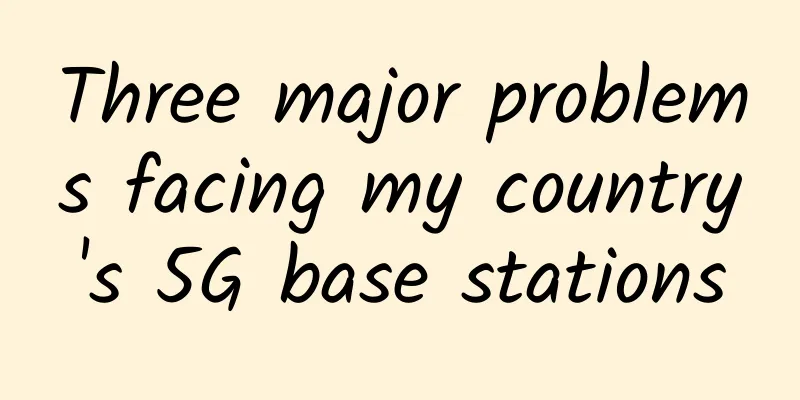Let government affairs walk in the "cloud" - Huawei's practice of government affairs cloud

|
2017 is destined to be an extraordinary year for China's cloud service market. The "Three-Year Action Plan for Cloud Computing Development (2017-2019)" recently released by the Ministry of Industry and Information Technology proposes that by 2019, the scale of my country's cloud computing industry will reach 430 billion yuan, and it will actively develop industrial cloud services and jointly promote government cloud applications. "Government cloud" has once again become "concrete" and will become more "vivid". Clouds and clouds rise - strengthening government, benefiting the people, and promoting business my country is at a critical stage of a new round of industrial transformation and upgrading. The country has proposed to implement "Made in China 2025" and promote innovation-driven development and other forward-looking strategies. The "13th Five-Year National Informatization Plan" has included "Internet + Government Services", the establishment of a unified and open big data system, and the construction of a new type of smart city in the twelve priority actions. The premise and foundation for achieving these goals is to build a government cloud with the goal of strengthening government, benefiting the people, and promoting business.
Driven by a number of national policies and enabled by the market, a "cloud-filled" government cloud market has gradually emerged, becoming an important measure to transform government functions, improve service capabilities, solve "information islands" between departments, and achieve data sharing and business innovation. In 2017, the government cloud market will reach a new height - not only in terms of scale, but also in terms of the scope and strength of government cloud applications, and the overall annual investment is expected to exceed 100 billion yuan. The explicit and implicit value brought by the government cloud is huge. A very practical example is that in the past, corporate legal persons had to go through complicated procedures to apply for relevant certificates at government agencies, queue up at multiple windows, and fill out multiple documents. With the government cloud, they only need to fill out a form at one window to apply for the certificate. This is the change that the government cloud has brought to the lives of ordinary people - government services have achieved one number, one window, and one network, allowing data to run more and people to run less. The derivative value of the government cloud can also be greatly stimulated. Relying on the government cloud to achieve data integration and sharing can not only improve the government's management, decision-making, people's livelihood, public services and other aspects of the ability. More importantly, it will also accelerate the upgrading of local industries, help mass entrepreneurship and innovation, use the "cloud" as a starting point to introduce and assist the entry of high-tech enterprises such as "Internet", "bioengineering", "artificial intelligence", and "software development", build a green industrial ecology, and comprehensively improve the level of local economy. In recent years, the migration of government services to cloud computing platforms has been accelerating. It can be said that cloud computing technology is strongly helping government clouds at all levels to achieve the goals of strengthening government, benefiting the people, and promoting business. After all, the future "cloud" will become the infrastructure that supports the overall social operation and urban development in the future, just like water, electricity, roads, railways, and broadband networks, and will become the basic support platform for the integration, sharing, and application of various information resources such as the economy, society, culture, and natural environment. Walking in the Clouds——The trilogy of “gathering, connecting and sharing” However, the construction of the government cloud is not achieved overnight. The government cloud has entered the government cloud 2.0 era characterized by system interoperability and data integration. From the perspective of industry attributes, the government cloud has excellent requirements for services, security, delivery, operations and other aspects of the cloud service life cycle. For the government cloud, the challenges at the business level mainly come from the need to adapt the organizational structure and business processes of government departments, including data and business security issues in the new cloud environment. At the technical level, how to connect information islands to achieve sharing and collaboration; how to connect data to accelerate business innovation; how to ensure the security of business cloud migration and avoid potential risks brought by business cloud concentration; and how to reduce management complexity and costs are also issues that need to be solved during the construction process. It can be seen that with the gradual rollout of government cloud applications, only manufacturers who truly possess "real skills" - cloud operation capabilities, familiarity with government business, customization capabilities, user experience capabilities, PaaS platform and SaaS application R&D capabilities, underlying architecture platforms for sustainable development, and overall service capabilities for cloud construction - will be able to dominate the market. With its technological advantages in the fields of network, cloud computing, unified collaboration, etc., Huawei has proposed the proposition of "basic resource integration, data integration, and business integration" in the construction of government cloud, and realized the three-step process of "gathering, communication, and sharing": first, build a government cloud platform, realize resource integration through the virtualization of physical resources and unified resource scheduling, meet the resource needs of different government applications, and achieve "gathering"; second, build a government data support platform, through the data exchange and sharing platform, collect information at all levels to form a government information center database, meet the data needs of upper-level government applications, and achieve parallel approval, so as to realize one-stop processing, and at the same time break down the information barriers between vertical departments at all levels and horizontal departments at the same level, so as to achieve the purpose of data integration and sharing and realize "communication"; finally, build a government application support platform and a big data platform to help government business innovation, achieve business integration, realize smoother cross-departmental collaboration, and ultimately move towards smart government affairs, assist in decision-making, and achieve "sharing". The "playing" of the trilogy of "gathering, connecting, and sharing" also sounded the "first note" of Huawei's government cloud services. Unity of knowledge and action: Huawei's rich experience in fulfilling its commitment to cloud computing With a deep understanding of government cloud, relying on virtualization software and cloud operating systems with independent intellectual property rights, as well as modular computer rooms, servers, storage, networks, security and other infrastructure and IT hardware equipment, Huawei has achieved truly independent and innovative comprehensive government cloud service capabilities, which can provide shared basic resources, open data support platforms, rich smart government applications, three-dimensional security guarantees and efficient operation and maintenance service guarantees. At the platform level, Huawei's FusionCloud cloud computing solution is based on the open OpenStack architecture, unified API, and unified ecosystem. It supports three scenarios: public cloud, private cloud, and hybrid cloud, achieving intensive, platform-based, and integrated development. In terms of security, it provides full-stack cloud security services, combining the operator's telecommunications physical and network-level security with operational security and Huawei's security technologies, capabilities, and experience to strictly protect user data security. It has passed the Ministry of Public Security's "Data Center Security Level 3 Certification" and the Ministry of Industry and Information Technology's cloud computing service capability "Enhanced Level" certification. In terms of services, Huawei has mature IT delivery capabilities, a team of 4,000 experts, three major IT delivery centers in Langfang, Xi'an, and Wuhan, as well as industry-standard methodologies and rich project practices, providing all-round government and enterprise cloud operation and maintenance management services to achieve efficient and smooth integration and migration of data centers. At present, Huawei has experience in delivering government cloud to more than 230 companies across the country, making it the practitioner with the most extensive experience in the field of government informationization. In Beijing, Huawei has built a distributed cloud data center for Beijing's government network and online government service hall, which unifies the management of multiple data center resources, providing effective support for the realization of Beijing's government informatization. It also relies on the data active-active disaster recovery solution to comprehensively ensure data security, and has passed the Level 3 security certification with high scores. The data center resource utilization rate has increased by 3.5 times, security threats have been reduced by 95%, and operation and maintenance efficiency has increased by 12 times. In Jiangxi, Huawei has built a provincial and municipal government cloud for the Jiangxi Provincial Information Center and 11 cities. Currently, more than 400 business systems have been deployed, eliminating the information islands originally scattered among various commissions, offices and bureaus, realizing resource pooling, and providing cloud host-based disaster recovery services for provincial and municipal government clouds, thereby minimizing data security risks while ensuring cost reduction and efficiency improvement. In Jiaxing, Huawei's big data and government cloud solutions have been used to build an integrated government information resource sharing and exchange platform for the entire city, completing data exchange and sharing among Haining Human Resources and Social Security Department, Civil Affairs Bureau, Municipal Government Service Network and other commissions and bureaus, truly realizing "one number, one window, one network" and improving people's satisfaction with government services. In Karamay, Huawei Enterprise Cloud has helped build nine clouds including e-government, attracted the top five domestic rendering companies, and Xinjiang's highest-throughput gene testing laboratory to settle down. Looking to the future, Huawei is also increasing its efforts in the government cloud. In particular, at the Huawei China Ecosystem Partner Conference 2017, Huawei increased its efforts in the government cloud at the integrated Huawei Cloud strategy level, and explicitly proposed joint innovation with a large number of partners to provide more complete and leading government cloud solutions from the perspective of a cloud ecosystem of great integration and collaboration, and to help the construction of a government cloud that is intensive, data-sharing, and innovatively applied to move forward. |
<<: Provincial and municipal government cloud services help "Smart Jiangxi" take a new leap forward
>>: How to configure OVN router?
Recommend
Kunpeng Technology Open Day came to Shenzhen Futian to see how cloud-intelligence integration will open up the future
[51CTO.com original article] At 2:00 pm this Satu...
The strength of the WiFi signal is related to this core factor. Don't get it wrong.
When buying a wireless router, you should buy one...
The Radio and Television Administration has decided to build a "National Network". Is the IPTV of the three major operators in danger?
Many people may not know that the traditional rad...
Security teams’ need for flow data drives NetSecOps collaboration
You’ve probably heard about the fact that network...
How does private 5G impact Industry 4.0 transformation?
Private 5G networks have become very popular as r...
5G is here—what’s next?
As 5G standards are finalized and 5G-enabled devi...
ExtraVM: $5.5/month KVM-1GB/12G NVMe/1TB/Japan Data Center
ExtraVM is a foreign hosting company founded in 2...
There are four major challenges in the development of 5G. The next 2-3 years will be a critical period for the development of 5G.
A total of more than 700,000 5G base stations hav...
How to Choose an Ethernet Cable
In most cases, choosing an Ethernet cable is rela...
HostDare: 35% off KVM in Los Angeles, starting at $25.99/year
HostDare is a foreign VPS hosting company founded...
2G network withdrawal has 200 million potential users, elderly mobile phones have pain points and no market
[[343834]] I have tried According to statistics f...
In 2017, the industry cloud finally became a big thing. It is not as simple as cloud + industry!
A reporter once asked many industry customers a q...
How to better migrate data centers
Migrating a data center is no small feat, and it ...
ExtraVM offers 30% off on Netherlands data center, 1Gbps unlimited traffic VPS starting at $3.5 per month
ExtraVM recently launched a new VPS host in the N...
Migu Video’s Wang Bin: The growth of the pan-entertainment industry in the 5G era
[51CTO.com original article] From July 11 to 13, ...


![[Black Friday] Sharktech High-Defense VPS 50% off, $47.7/year-2GB/40GB/4TB/Los Angeles and other data centers](/upload/images/67cac00f76a6f.webp)






